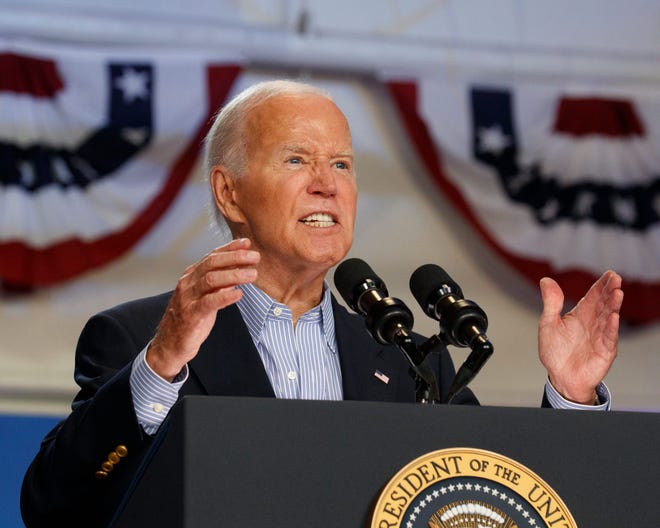WASHINGTON – When President Joe Biden walked into the House chamber last March to deliver his annual State of the Union address, even his supporters worried about his aging and declining mental abilities.
But Biden at least temporarily allayed those concerns with an inspiring speech that far exceeded the low expectations generated by Republicans’ portrayal of him as a stumbling, dazed old man. The 81-year-old president was impassioned, courageous and, at times, downright defiant.
Four months later, amid new questions about whether he is physically and mentally fit to serve another four years in office, Biden appeared much more composed in a television interview on Friday.
The White House and Trump’s reelection campaign were seeking a high-profile event to provide another reassurance, to erase memories of his disastrous debate with former President Donald Trump about a week ago and quell growing calls from Democrats for him to stop seeking a second term.
But Friday’s interview, which aired just four months before the Nov. 5 election, didn’t carry the same impact as last March’s speech.
Prepare to vote: See who’s running for president and compare their positions on key issues with our Voter Guide
There was no career-ending gaffe or egregious misstep that would have forced him to withdraw from the election, but there was also no defining moment that would have put an end to the current crisis that threatens to put an end to his long political career.
At the heart of that crisis are Democrats’ fears that Biden will lose to Trump in November, growing concerns about Biden’s mental state and the profound impact the next four months will have on the octogenarian president’s political career.

For 22 minutes, and in a somewhat raspy voice, Biden parried questions from ABC News’ George Stephanopoulos about his fitness to serve as president, his recent debate gaffes and calls for him to withdraw from the race so Democrats can nominate another candidate who has a better chance of beating Trump.
Biden dismissed polls that suggest he will lose to Trump in November’s presidential election, saying: “I remember being told the same thing in 2020… the polls are showing I can’t win.”
He dodged questions about reports that his mental health problems were becoming more frequent: “Can I run 100 metres in 10 minutes? No,” he said, “but I’m still in good shape.”
He declined to commit to undergoing an independent neurocognitive test and releasing the results. He said that being president and seeking reelection is a cognitive test in itself.
“I take cognitive tests every day,” he insisted.
And he refused to even entertain the idea that top Democratic officials might ask him to drop out of the race. “They’re not going to do that,” he said.
Six takeaways from the ABC interview:Despite missteps, criticism and polls, Biden perseveres

Biden’s interview, recorded Friday after a campaign rally in Madison, Wisconsin, culminated a week of damage-control efforts by the White House and campaign after his debacle with Trump on June 27. During the televised debate, Biden spoke hoarsely, at times unable to finish his thoughts, could not finish sentences and was unable to effectively rebut Trump’s torrent of lies.
Biden’s poor performance stoked concerns that he may not have the mental strength to serve another four years in office and sparked panic among some Democrats who plan to formally nominate him as the party’s candidate in Chicago next month.
Shortly before the interview aired, a fourth Democratic congressman, Rep. Mike Quigley of Illinois, called on Biden to drop out of the race to give the party time to nominate another candidate. In the Senate, Sen. John Warner of Virginia is reportedly organizing a group of Democratic senators to ask Biden to drop out, according to The Washington Post.
‘it hurts’:Battleground state voters react to Biden vs. Trump presidential debate
In the interview, Biden again blamed a “bad cold” and fatigue for his disjointed debate performance. “I was sick,” he said. “I felt awful.”
He continued to assert he could beat Trump in November, despite pre-debate polls showing him narrowly losing, and post-debate polls showing Trump closing the gap even further.
Biden used the interview as an opportunity to remind the public of his accomplishments during his time in office, citing the expansion of NATO, taking on Big Pharmaceuticals over exorbitant drug prices and a report on Friday that the economy added more than 200,000 jobs in June.
“I’m running again because I believe I better understand what we need to do to take this country to a whole new level,” he said. “We’re starting to get on that path.”
But Democrats aren’t questioning his record; they’re questioning whether he can beat Trump.
“The president is rightly proud of his record,” David Axelrod, a political strategist who twice helped Barack Obama win the presidency, wrote on X (formerly Twitter). “But he is dangerously oblivious to people’s concerns about his abilities going forward and where he stands in this race. Four years ago at this time, the president was leading Trump by 10 points. Today, he’s six points behind.”
Towards the end of the interview, Stephanopoulos asked Biden how he would feel in January if Trump was re-elected, a response that is unlikely to silence critics who have called for him to step down.
“As long as I’ve done my best and done the best job I can, I’ll feel that way,” he said. “That’s what this job is about.”
Democratic Governors to Biden:“The path to victory is the top priority”
Biden hinted at one scenario in which he might change his mind.
He might be persuaded to drop out, he said, “if the almighty God came down and told me.”
He maintained that he would continue his campaign unless there was divine intervention.
Michael Collins covers the White House. Follow him at X @mcollinsNEWS.

